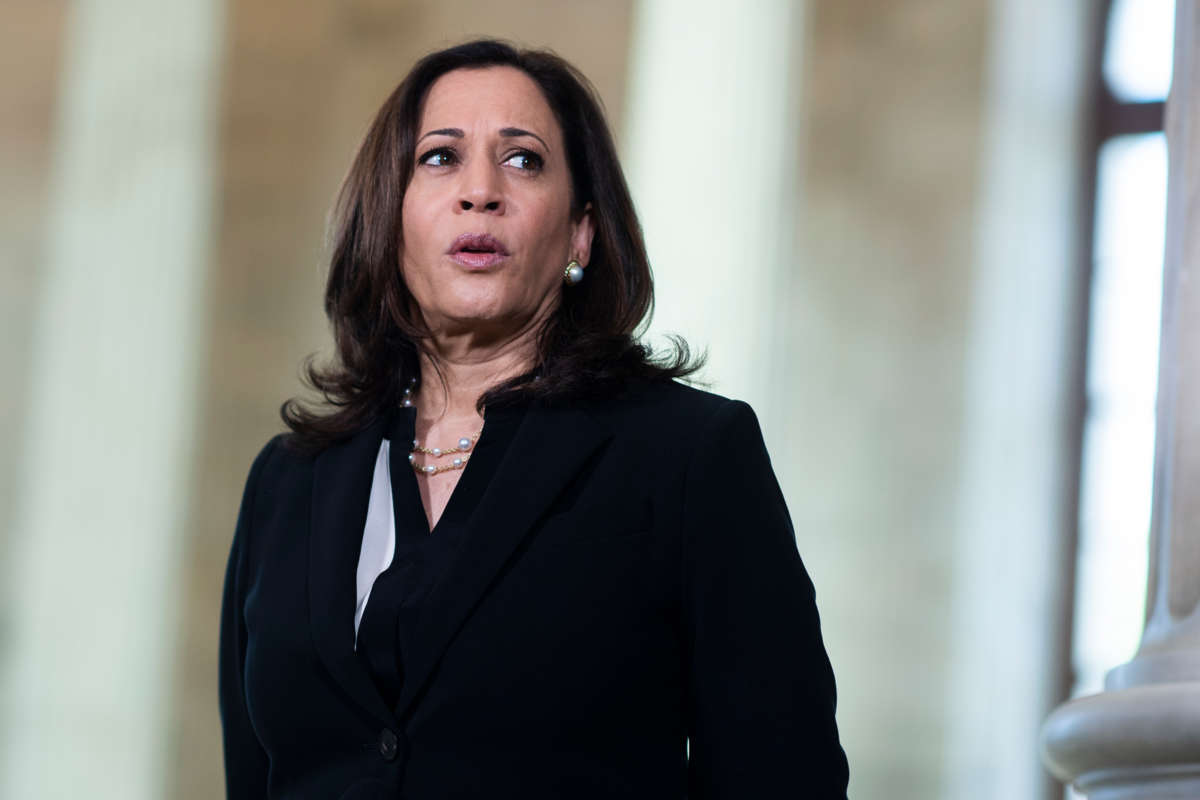Kamala Harris has become the first woman of color to receive a major U.S. party’s nomination for vice president in large part thanks to widespread changes in consciousness resulting from the swelling tide of #MeToo and Black Lives Matter activism.
A swirl of inside-baseball news articles and opinion pieces throughout midsummer offered early indications of Joe Biden’s likely pick to join him on the Democratic Party ticket as nominee for vice president. Amid rising waves of feminist and anti-racist struggle, many had declared that the nominee would have to be a Black woman. As a result, Biden’s nomination of Harris (whose father is Black and mother is South Asian) is not unanticipated, even while it is notable, unprecedented and momentous.
This development raises questions regarding how the Democratic Party relates to anti-oppression and grassroots movement organizing, and how such organizing should relate to the party.
Ultimately, our task as movement activists remains what it has long been, what it will continue to be in November, and regardless of who wins, what it will also be in January: to build an independent, multiracial, grassroots, working-class movement for freedom and democracy, and to defend it against all attempts to disorganize or demobilize it. The particulars of how we carry out this task shift with changing circumstances.
In the early weeks of August, speculation mounted regarding whether Biden and Harris could overcome a June 2019 clash during the primary debates over 1960s and ‘70s school desegregation policy. Harris, slamming Biden’s record on race and his keenness to find common ground with segregationists, said, “You also worked with [those segregationist senators] to oppose busing. And there was a little girl in California who was part of the second class to integrate her public schools and she was bused to school every day. And that little girl was me.”
This moment of temerity was a pivotal moment in raising Harris’s national profile, but to the extent that recent leaks from sources around and within the Democratic Party are to be believed, it also created bad blood between the two candidates — bad blood that had to be overcome in order for Harris to secure Biden’s nod.
The question came down to “trust.” Harris had called Biden to account over his racist record once. Could she be trusted not to do something like this again? Presumably, the Biden campaign is now satisfied that the answer to that question is “Yes.”
This negotiation between Biden and Harris, which was resolved amicably and in favor of a woman of color poised for one of the most powerful positions in U.S. government, is not mere Beltway intrigue. Rather, it is indicative of the price of elite power.
Harris, a former prosecutor who enthusiastically enforced truancy laws that disproportionately impacted poor women of color, is hardly some Black Lives Matter radical — quite the opposite. And yet, standing up for school desegregation — in 2019 — was only just barely forgivable. It was not Biden who would apologize for his past stance, but Harris who would kiss the ring and prove herself loyal.
Those of us engaged in struggle from below will never find ourselves making the kinds of calculations that are necessary to further a career in elite U.S. party politics, and we do not need to concern ourselves overly much with wrangling over moral judgments on every individual detail of how that sausage gets made. All of it is ugly. What does matter for us is the question of political leadership. Will we allow ourselves to be led by this party, and if so, then led toward what?
The electoral question — whether or not to vote for the Democrats — and the leadership question must be treated as distinct. Given the obviousness of the Trump threat and the equally obvious shortcomings of the Democratic Party, not many minds will be changed on the voting question between now and November.
What is much more urgent is for those who agitate for racial justice to ask ourselves now whether we will follow elite Black Democratic Party politicians’ lead in blunting demands for racial justice and real reckoning with the country’s racist past.
Activists for justice and freedom must take our lead not from the exigencies of machine politics, but from the people in the streets who have moved the struggle for justice further forward in the last few months than it had been moved by several decades of compromise, backroom deals and elite representation. It is the mass struggle of the 1960s that created the political pressure which opened the doors of Thousand Oaks Elementary School so Harris could walk through them. If the doors of the vice president’s office open for Harris in January, it will be mass unrest that forced them apart. But as is so often the case, the people who make the good things of this world may turn out to benefit the least from their labor. If we want things to be different, our politics cannot follow Biden’s and Harris’s paths into the White House. Politically, theoretically and quite literally, we must follow the people into the streets.
Join us in defending the truth before it’s too late
The future of independent journalism is uncertain, and the consequences of losing it are too grave to ignore. To ensure Truthout remains safe, strong, and free, we need to raise $17,000 by midnight tonight. Every dollar raised goes directly toward the costs of producing news you can trust.
Please give what you can — because by supporting us with a tax-deductible donation, you’re not just preserving a source of news, you’re helping to safeguard what’s left of our democracy.
